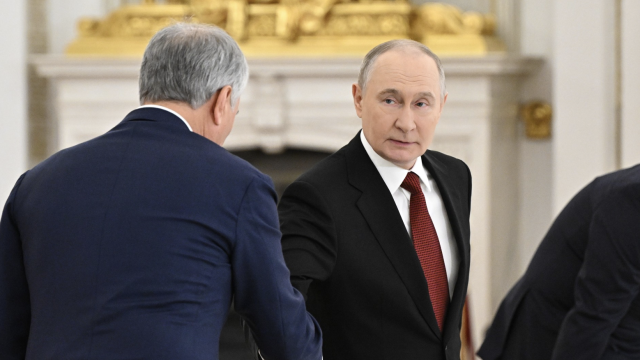Kissing his boyfriend during a protest in front of the State Duma earned Pavel Samburov 30 hours of detention and the equivalent of a $16 fine on a charge of "hooliganism."
But if a bill that comes up for a first vote later this month becomes law, such a public kiss could be defined as illegal "homosexual propaganda" and bring a fine of up to $16,000.
The legislation, being pushed by the Kremlin and the Russian Orthodox Church, would make it illegal nationwide to provide minors with information that is defined as "propaganda of sodomy, lesbianism, bisexuality and transgenderism."
It includes a ban on holding public events that promote gay rights. St. Petersburg and a number of other cities already have similar laws on their books.
Samburov describes the bill as part of a Kremlin crackdown on minorities of any kind — political and religious as well as sexual — designed to divert public attention from growing discontent with Putin's rule.
The lanky and long-haired Samburov is the founder of the Rainbow Association, which unites gay activists throughout Russia. The gay-rights group has joined anti-Putin marches in Moscow over the past year, its rainbow flag waving along with those of other opposition groups.
Denis Volkov, a sociologist for the Levada Center, an independent pollster, said the anti-homosexuality bill fits the "general logic" of a government intent on limiting various rights.
But in this case, the move has been met mostly with either indifference or open enthusiasm by average Russians. Levada polls conducted last year show that almost 67 percent of Russians find homosexuality "morally unacceptable and worth condemning." About half are against gay rallies and same-sex marriage. Almost a third think homosexuality is the result of "a sickness or a psychological trauma," the Levada surveys show.
Russia's widespread hostility to homosexuality is shared by the political and religious elite. Lawmakers have accused gays of decreasing Russia's already low birth rates and said they should be barred from government jobs, undergo forced medical treatment or be exiled. Orthodox activists criticized PepsiCo for using a "gay" rainbow on cartons of its dairy products.
The anti-gay sentiment was seen Sunday in Voronezh, a city south of Moscow, where a handful of gay activists protesting the bill were attacked by a much larger group of anti-gay activists, who hit them with snowballs.
The protest that won Samburov a fine took place in December. Seconds after Samburov and his boyfriend kissed, militant Orthodox activists pelted them with eggs.
Police intervened, rounding up the gay activists and keeping them for 30 hours, first in a frozen van and then in an unheated detention center. The Orthodox activists were also rounded up but were released much earlier.
Those behind the bill say minors can't evaluate the information critically and therefore need to be protected from "homosexual propaganda,"
"This propaganda goes through the mass media and public events that propagate homosexuality as normal behavior," the bill reads.
Cities started adopting anti-homosexuality laws in 2006. Only one person has been prosecuted so far under a law specifically targeted at homsexuality. Nikolai Alexeyev, a gay-rights campaigner, was fined the equivalent of $160 after a one-man protest last summer in St. Petersburg.
In November, a St. Petersburg court dismissed a lawsuit filed by the Trade Union of Russian Citizens, a small group of Orthodox conservatives and Putin loyalists, against pop star Madonna. The group sought $10.7 million in damages for what it says was "propaganda of perversion" when Madonna spoke up for gay rights during a show three months earlier.
The federal bill's expected adoption comes 20 years after a Stalinist-era law punishing homosexuality with up to five years in prison was removed from the Criminal Code as part of the democratic reforms that followed the Soviet Union's collapse.
Gays have been whipsawed by official pressure and persistent homophobia. There are no reliable estimates of how many gays and lesbians live in Russia, and only a few big cities such as Moscow and St. Petersburg have gay nightclubs and gyms.
In other parts of Russia, gays feel even less secure. Bagaudin Abduljalilov moved to Moscow from Dagestan, a predominantly Muslim region, where he says some gays have been beaten and had their hands cut off, sometimes by their own relatives, for bringing shame on their families.
"You don't have any human rights down there," he said. "Anything can be done to you with impunity."
Shortly before moving to Moscow, Abduljalilov left Islam to become a Christian, but he was expelled from a seminary after telling the dean he is gay. He also has had trouble finding a job as a television journalist because of discrimination against people from Dagestan.
"I love Russia, but I want another Russia," said Abduljalilov, 30, who now works as a clerk. "It's a pity I can't spend my life on creative projects instead of banging my head against the wall and repeating, 'I'm normal, I'm normal.' "
Related articles:
A Message from The Moscow Times:
Dear readers,
We are facing unprecedented challenges. Russia's Prosecutor General's Office has designated The Moscow Times as an "undesirable" organization, criminalizing our work and putting our staff at risk of prosecution. This follows our earlier unjust labeling as a "foreign agent."
These actions are direct attempts to silence independent journalism in Russia. The authorities claim our work "discredits the decisions of the Russian leadership." We see things differently: we strive to provide accurate, unbiased reporting on Russia.
We, the journalists of The Moscow Times, refuse to be silenced. But to continue our work, we need your help.
Your support, no matter how small, makes a world of difference. If you can, please support us monthly starting from just $2. It's quick to set up, and every contribution makes a significant impact.
By supporting The Moscow Times, you're defending open, independent journalism in the face of repression. Thank you for standing with us.
Remind me later.





